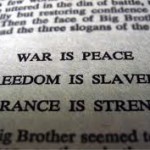OR: Don’t Shoot Brian Phillips, He’s Only the Typist
George Orwell first brought it to my conscious attention, this capacity of ours to accept violently opposite things at the same time, using the same set of brain cells. “Doublethink”, he called it. With adolescent loftiness, I had started in my early teens to notice how my reading and my family urged me to be reasonable all week, while Sunday morning church seemed to demand that I put sense in a headlock and believe a dozen dubious things before lunch. (After that, I could return to the eminent reasonableness of NFL double-headers or five hours of road hockey.) By the end of high school, I’d come to 1984, and
been punched by Orwell’s description of a totalitarian regime with its Thought Police and, of course, its doublethink, “the power of holding two contradictory beliefs in one’s mind simultaneously, and accepting both of them.”
Since at least those high school days, I’ve felt conflicted about my deep and dedicated love of sport. Most of the time, it just meant that I was the “flake” on the team, even when I was its best player, or that I always felt dislocated. As a “grown-up” athlete, I sometimes felt like my face in the team picture was out of focus; I didn’t share my teammates’ affection for beer or pickups (female or automotive), nor their enthusiastic ignorance of books and other flaky ponderables. “Don’t think too much, Howdy, you’ll hurt the ball-club” was at first the wise and kindly advice of an educated vet of the ball diamond, who occasionally caught me trying to understand hitting at the same time that I was doing it. (Yogi knew.) As time passed, though, in the locker room and finally in my own mind, it became a mocking sort of mantra which suggested that sport and introspection were, or maybe ought to be, mutually exclusive.
So what? So: I love basketball but hate the corporate excesses of the NBA — well, or even the NCAA and its “student-athletes”, so often a venue for a level of doublethink that Orwell might have nodded at grimly. I still furiously try to believe that coaches and sport can build character, and not just reveal it. However, too many lurid peeks into the minds, and the absurd or horrible deeds, of hyper-entitled athletes have worn me down. They mutter at me. Liar! I try not to listen. Yet every time my careening freight-load of love for sport smashes into my sons’ determined ambivalence towards it – and I find, among the wreckage, a huge and humiliating puncture in my puffed-up “self-of-steam” (as one of my student writers ingeniously spelled it) – I realize how muddled my head can get about the whole gamey business.
The Grantland website is a refuge for me, since I can often read about sport or film and not feel insulted. I learn things. I feel a little smarter sometimes. There are really fine writers, and the occasional frank undermining of fan fantasies and other castles in the athletic air. Among the unabashed love for favourite glittering bits of pop culture tinsel, there is genuine intelligence. Bill Simmons, the editor and self-described “Sports Guy”, is still an eager, bright-eyed lover of his many games, and is mainly not cynical, but neither is he blind. He even questions his own devotion, most notably in a 2012 piece , a post-Super Bowl dirge in which he touchingly asked, “Why does this stuff mean so much?” (I answered him at length HERE, but there’s no sign that he listened. If the book ever gets finished, we’ll go deeper, harder and more recklessly into that stinking cave of sweaty darkness.) Why, indeed? Yet there’s no doubting that it does. Thus ends my preamble.
My main point, here, is to encourage you to read a recent Grantland article that I’d be proud to have written. Don’t hold it against Brian Phillips if I tell you that he’s really smart, and thinks about the sports he loves and the way he loves them in a way that is
often exuberant and delightful and unexpected. Looking back on 2013, as mags and websites and TV shows (and even this blog) are wont to do, though, he was as serious and as penetrating as I’ve read him. His retrospective was called “The Year of Un-Innocence: Why 2013 made it impossible to watch sports with a clear conscience — and why we kept watching anyway”. In it, he stares straight into the high-beams of how jacked and holy shit!-ted we can get about the beauties and the wonders of our games, even when we know of the corruption, the broken bodies and the casual hedonism beyond the sidelines. (CTE. Alex Rodriguez. Oscar Pistorius. I won’t go on.) It’s not the “feel-good story of the year”, but I urge you to read it. It’s honest, it’s penetrating, and it speaks with a clear voice and admirable uncertainty about the double-think, the head-fakes and mental double-moves that might just be necessary, the conceptual props for our continued huddling in a house of cards.


